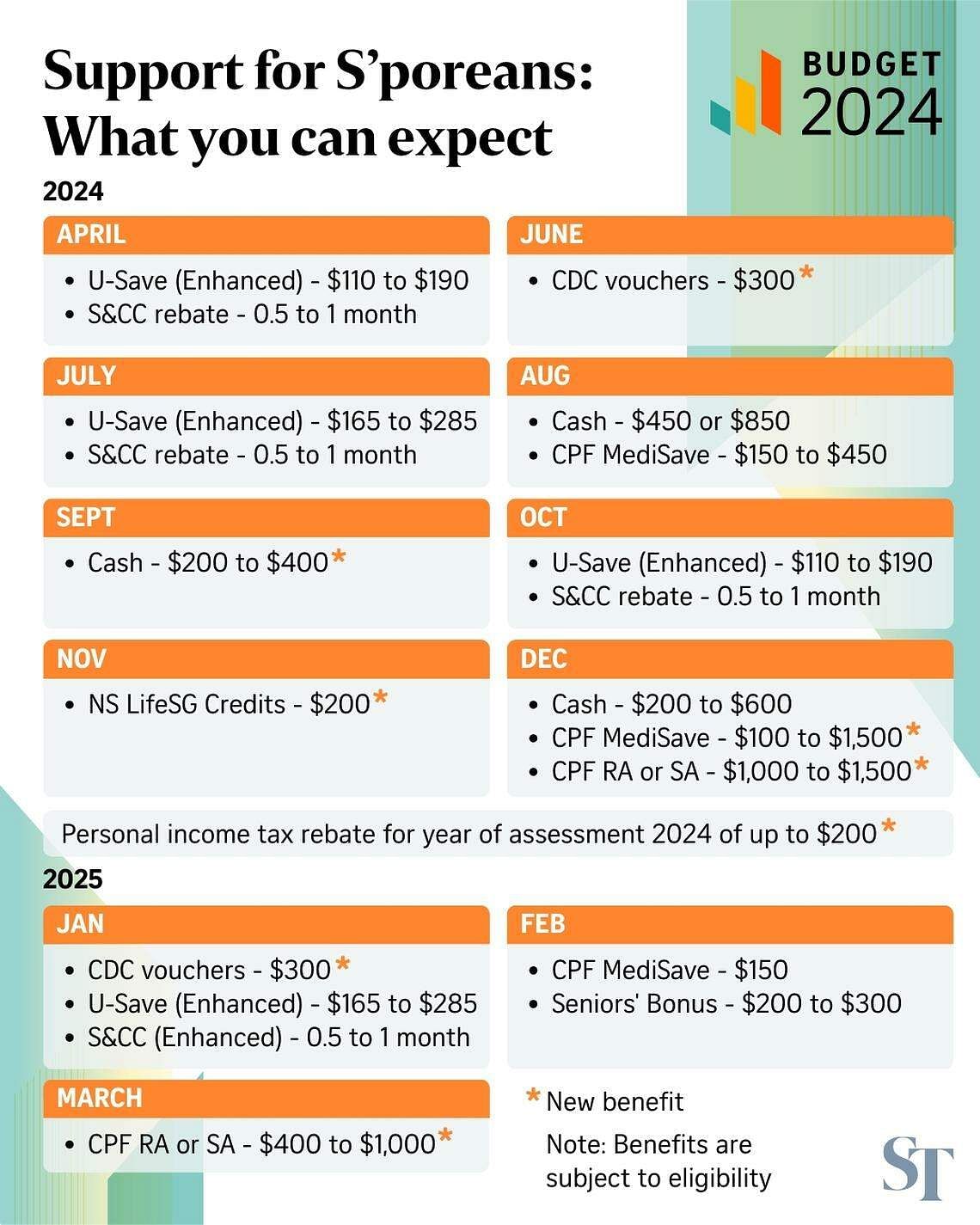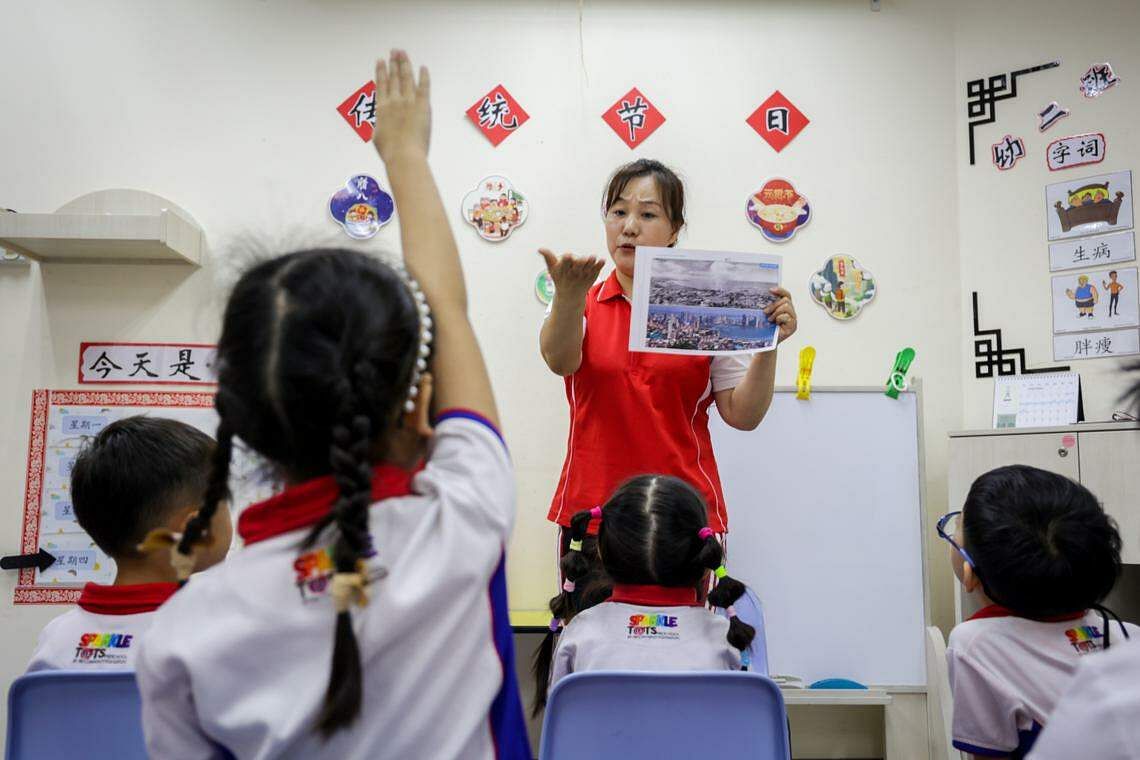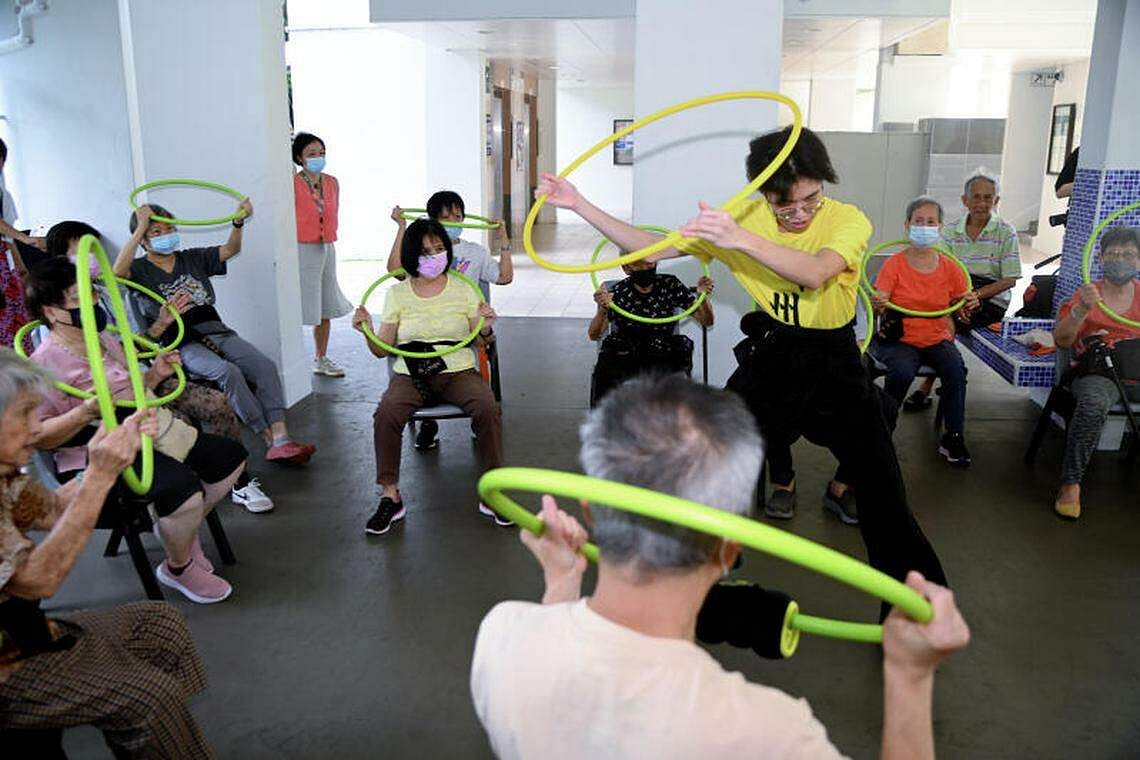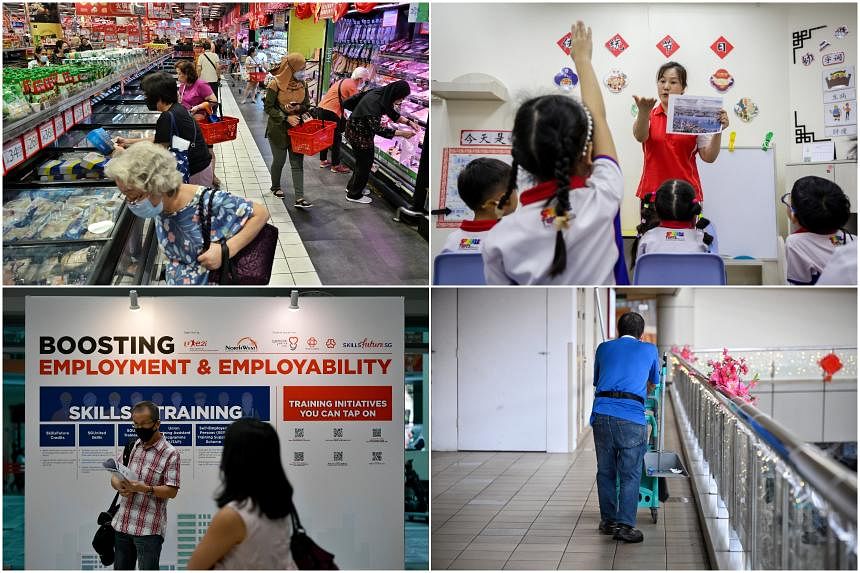SINGAPORE – From workers to seniors, individuals to households, Budget 2024 has something for everyone to cope with cost-of-living pressures.
Deputy Prime Minister and Minister for Finance Lawrence Wong on Feb 16 unveiled a suite of support measures for all Singaporeans, including cash payouts, Community Development Council (CDC) vouchers for households, and mid-career training allowances for Singaporeans aged 40 and older.
Here’s what you can expect:
Individuals
- Singaporeans aged 21 and older will receive between $200 and $2,150 in cash payouts between April 2024 and March 2025, depending on their eligibility.
- A personal income tax rebate of 50 per cent, capped at $200, will be given for the year of assessment 2024.
- $200 National Service LifeSG credits will be given for all past and current national servicemen.
- All Singaporeans will get $100 to $1,650 in top-ups to their Central Provident Fund (CPF) MediSave Account, depending on their eligibility.
- Singaporeans born in 1973 or earlier will receive bonuses of $400 to $2,500 in their CPF Retirement Account or Special Account, depending on their eligibility.

Households

- All Singaporean households will get $600 in CDC vouchers, half of which will be given out in June 2024 and the other $300 in January 2025.
- Eligible HDB households will receive $550 to $950 in U-Save rebates, depending on the size of their flat.
- Eligible Singaporean households in HDB flats will also get service and conservancy charges rebates to offset two to four months’ charges.
Families

- Eligible families who have booked their Build-To-Order flats but need a place to stay while waiting for their flats to be completed can apply for a one-year Parenthood Provisional Housing Scheme (Open Market) voucher to offset their rents of HDB flats in the open market. HDB currently offers subsidised rental housing under the Parenthood Provisional Housing Scheme.
- Monthly full-day childcare fee caps will be reduced in government-supported pre-schools in 2025 to $640 for anchor operators and $680 for partner operators. This is before the childcare subsidies that all families benefit from.
- Existing pre-school subsidies will be enhanced for lower-income families. Currently, more subsidies are given to children with working mothers. This will be extended to all children from lower-income families, including those with non-working mothers.
- ComLink+ Progress Packages will be launched to support lower-income families that enrol their children in pre-schools, and take action to remain employed, stay financially stable and save up for home ownership. For example, if these families ensure a child is enrolled in pre-school in the year the child turns three, they will get a one-off $500 top-up to the child’s Child Development Account.
- The annual income threshold will be raised for dependant-related personal income tax reliefs to $8,000 from the year of assessment 2025.
- For families with children with special needs, maximum monthly fees at special education schools and fee caps at all special student care centres will be lowered.
- More support will also be given to people with disabilities in employment and for integration into the community. Spaces will be expanded in sheltered workshops and day activity centres.
Workers

Mid-career reskilling for Singaporeans aged 40 and above
- A $4,000 SkillsFuture Credit (Mid-Career) top-up will be given in May 2024. This can be used for selected industry-oriented training courses with better employability outcomes.
- Subsidies will be available for another publicly funded full-time diploma.
- Up to $3,000 in monthly training allowance will be given for up to 24 months, for selected full-time courses.
Lower-wage workers
- Workfare Income Supplement scheme payouts will be increased to a maximum of $4,900 per year, up from $4,200, and the qualifying income cap will be raised from $2,500 to $3,000 from January 2025.
- The Local Qualifying Salary will be raised from $1,400 to $1,600 from July 2024. This means that companies that employ foreign workers must pay all full-time local workers at least $1,600. The minimum hourly rate will be increased from $9 to $10.50.
- The Progressive Wage Credit Scheme (PWCS), where the Government co-funds the pay increases of lower-wage workers, will be increased in 2024 to a maximum of 50 per cent from 30 per cent. The PWCS wage ceiling will be raised to $3,000 in 2025, from the current $2,500.
Institute of Technical Education (ITE) graduates
- To encourage and support more ITE graduates aged 30 and below to upskill, their Post-Secondary Education Account will be topped up by $5,000 when they enrol in a diploma course at a polytechnic, the ITE, Nanyang Academy of Fine Arts or Lasalle College of the Arts. They will also get a $10,000 top-up to their CPF Ordinary Account after they complete the course.
- There will be a temporary financial support scheme for involuntarily unemployed workers while they undergo training or look for jobs. More details will be announced later in 2024.
Seniors

- Eligible seniors earning up to $6,000 a month will receive a yearly bonus of up to $1,000 to their CPF Retirement Account or Special Account for as long as they work. Those who have retirement savings below the Basic Retirement Sum will also get a one-time retirement savings bonus of between $1,000 and $1,500.
- $3.5 billion will be set aside to support seniors in their homes and communities, such as by expanding the network of Active Ageing Centres, and introducing more senior-friendly home fittings and commuter infrastructure.
- The per capita household income thresholds will also be increased for healthcare and associated social support subsidy schemes.
- The Matched Retirement Savings Scheme will be expanded. The scheme helps Singaporeans aged 55 to 70 with less CPF savings by providing dollar-for-dollar matching for cash top-ups to their CPF accounts. The expanded scheme will cover Singaporeans aged 55 and above, and increase the annual matching cap to $2,000, with a lifetime matching cap of $20,000.
- The CPF Enhanced Retirement Sum (ERS) will be increased from three to four times the Basic Retirement Sum. The ERS is the maximum amount that people can put into their CPF Retirement Account to receive CPF payouts. This means the ERS in 2025 will be $426,000.
- The interest-free Giro instalment plan for residential property tax bills will be extended to 24 months for eligible retirees aged 65 and above.
Read DPM Lawrence Wong’s Budget speech in full.
Correction note: In an earlier version of the story, we said that individuals who do not own more than one property will receive between $200 and $2,150. This is incorrect. Singaporeans who own more than one property will receive $200. We are sorry for the error.


